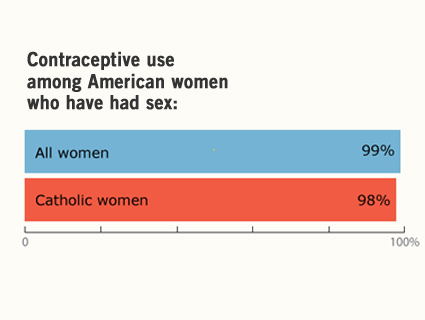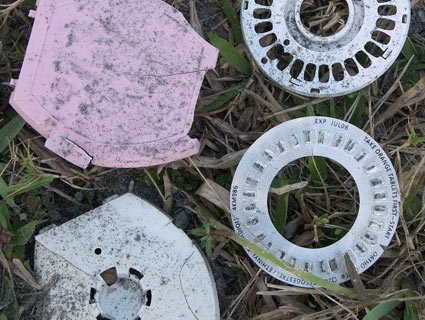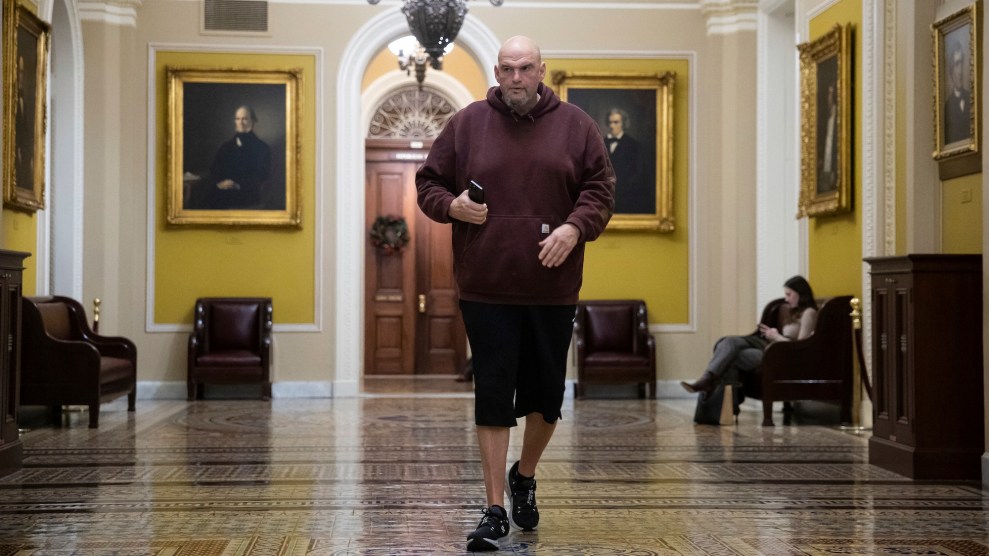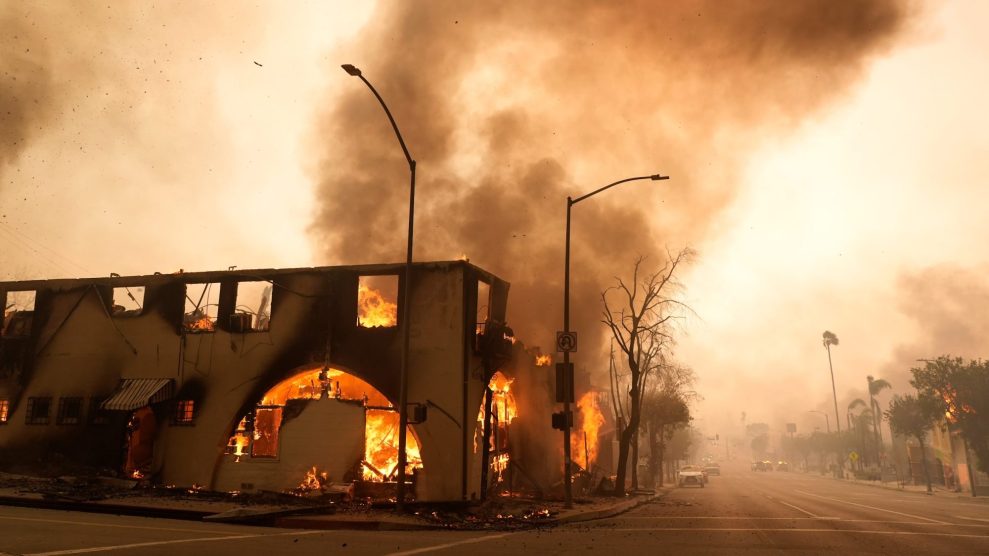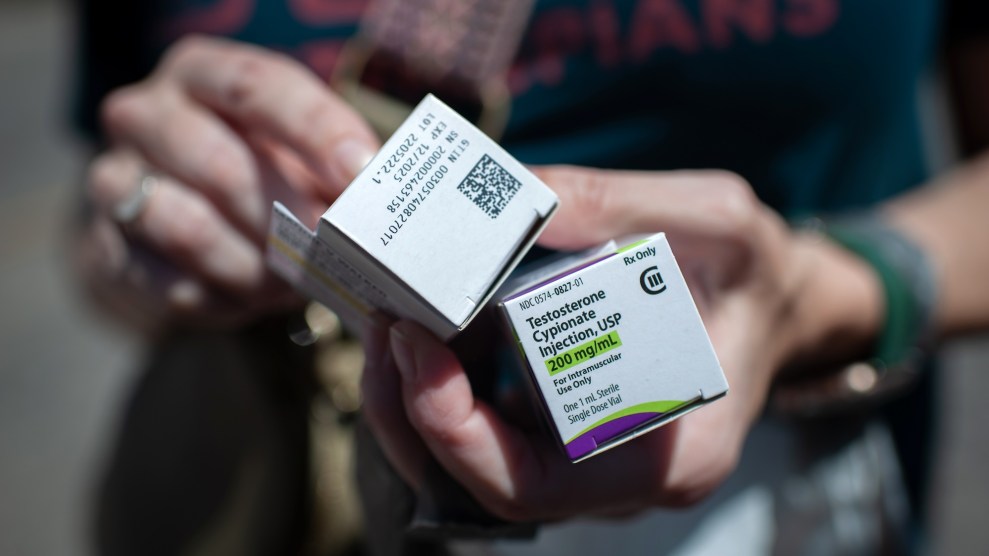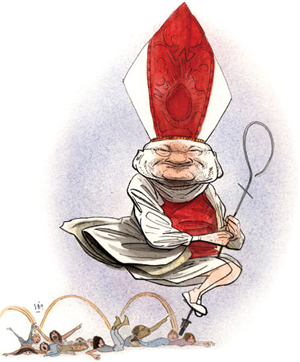 Illustration by Steve BrodnerLast December, at a contentious hearing of the House Committee on Oversight and Government Reform, a group consisting almost entirely of men weighed in on women’s health care. Millions of federal dollars were at stake. Two Obama officials were facing an inquisition. Rep. Chris Smith (R-N.J.)—who wasn’t even a member of the committee but was invited by chairman Darrell Issa (R-Calif.) to speak—was red-faced and practically shouting as he delivered his opening remarks: “The Obama administration’s bias against Catholics is an affront to religious freedom and a threat to all people,” he inveighed.
Illustration by Steve BrodnerLast December, at a contentious hearing of the House Committee on Oversight and Government Reform, a group consisting almost entirely of men weighed in on women’s health care. Millions of federal dollars were at stake. Two Obama officials were facing an inquisition. Rep. Chris Smith (R-N.J.)—who wasn’t even a member of the committee but was invited by chairman Darrell Issa (R-Calif.) to speak—was red-faced and practically shouting as he delivered his opening remarks: “The Obama administration’s bias against Catholics is an affront to religious freedom and a threat to all people,” he inveighed.
Smith’s attack was rooted in a now-familiar dispute—the escalating war between conservatives and the Obama administration over reproductive health. But there was a special wrinkle: Smith was concerned with foreigners forced into prostitution in the United States—and the right of the Catholic Church to refuse to provide them with access to birth control and abortion.
Thanks to legislation authored by Smith, the federal government spends millions of dollars each year to help human trafficking victims recover. Since 2006 virtually all of the money has gone to the US Conference of Catholic Bishops, the church’s leadership in Washington. But in September the Obama administration declined to renew the contract. It wanted to ensure that victimized women had access to full reproductive health care, and the bishops had forbidden the grant money to be used for services they deemed immoral.
Ever since, Smith and other USCCB supporters have been denouncing Obama, accusing him of an unconscionable attack on religious freedom. The House committee spent three hours grilling the Obama officials, pressing them on whether an anti-Catholic bias was at work inside the White House. A far more public blowup came a few weeks later, when the administration required Catholic-affiliated institutions like hospitals and universities to provide contraceptive benefits to employees. The president would ultimately engineer a compromise, shifting the payment responsibility to insurance companies, but even that did nothing to quell the outcry.
Allegations that Obama is anti-Catholic promise to escalate as Republicans seek to win key Catholic voting blocs in states such as Florida and Ohio. But warring over women’s reproductive health may be risky: National surveys show that the majority of women, including among Catholics, agree with Obama’s policies on birth control and are turned off by Republicans’ emphasis on the issue. Meanwhile, in the trafficking fight, Republican tactics could end up hurting the very victims that politicians like Smith claim to be fighting for: people like “Celia,” a teenager who was beaten, raped, and impregnated before being rescued in 2006 by law enforcement officials who broke up a sex trafficking ring in California.
The bishops’ protestations are no coincidence, but rather fit with a strategic battle dating back more than a decade. In 1998 the Catholic magazine Crisis observed that America’s 50 million Catholics had emerged as the “Holy Grail of coalition politics.” For decades, Catholics had been reliable Democrats, but as that began to change, the magazine commissioned pollster Steven Wagner, who’d helped craft the GOP’s 1994 Contract With America, to undertake a study of Catholic voters. The results indicated that Catholics who didn’t spend much time in the pews remained largely Democratic. But conservatives, Wagner argued, were missing an opportunity to tap into a pool of swing voters: active Catholics who go to Mass at least once a week and whose views were starting to align with those of evangelical Christians.
The Crisis editor who’d commissioned the poll, Deal Hudson, led an outreach effort for George W. Bush’s presidential campaign; Bush sought wider support from religious voters in part by pledging to knock down barriers to faith-based organizations getting federal contracts. Hudson’s reward was to helm the first-ever Catholic advisory committee to the White House. (He stepped down in 2004 from Bush’s reelection campaign in the wake of news that he’d “surrendered his tenure” as professor at Fordham University after a student accused him of sexual harassment.) Meanwhile, in 2003 pollster Wagner went to work leading the recently established human trafficking office within the Department of Health and Human Services despite having little relevant experience. “I actually at that time had never heard of human trafficking,” he acknowledged in an interview at his office on Capitol Hill, where he now works as a political consultant.
The federal program to help trafficking victims owes its existence to the advocacy of an unusual coalition of evangelical, feminist, and human rights groups in the 1990s. By 1999 they persuaded Congress to hold hearings, in which sex trafficking victims from Nepal, Russia, and Mexico told horrific stories and a State Department official testified that as many as 50,000 women and children were trafficked to America every year.
Rep. Smith and his colleagues responded with legislation that would be endorsed by everyone from Gloria Steinem to the National Association of Evangelicals. It pumped millions of dollars into victim services, prevention, and law enforcement efforts to prosecute ringleaders. But when Wagner took charge of the trafficking office, he discovered that the effort was proving something of a bust: Law enforcement had trouble finding traffickers inside the country to prosecute, and the government was giving hundreds of thousands of dollars to an array of nonprofit groups serving few, if any, victims.
Wagner concluded that nonprofits should get funds only if they actually served victims. He advocated an approach used by the bishops, who were already getting federal funding and doling it out to subcontractors on a per capita basis to help trafficking victims. After a bidding process in which USCCB was one of two organizations vying for the money, it ended up with all of the $19 million dedicated for trafficking victim services from 2006 through 2011.*
The bishops took about a third of the money for administrative costs. With the rest, they paid subcontractors around the country to provide services—on the church’s terms. Subcontractors could not discuss contraception or abortion, or even use staff time to refer clients for such services, on the church’s dime. (It is illegal to use federal money to pay for abortion except in the most extreme cases, but before the bishops took over, the funding could go toward providing abortion information and referrals.)
Some of the subcontractors, especially the secular ones, bristled at the restrictions. “We’re talking about a group of people [who] have endured rape and no health care, so many of them have untreated infections,” says Florrie Burke, who serves on the steering committee of the New York Anti-Trafficking Network. “Many of them have been exposed to HIV. They’ve had forced abortions. The gynecological issues are horrendous.”
*Correction: Due to a fact-checking error, the version of this story appearing in the May/June 2012 issue of the magazine stated that USCCB was the only large organization vying for the money; the Salvation Army also participated in the bidding process.
Until 2007, Burke was director of the anti-trafficking program at Safe Horizon, a nonprofit in New York. She says that at one point after the bishops took over, her group submitted an invoice for a gynecological exam that a victim had received at Planned Parenthood. USCCB denied payment, she says, without even inquiring about what the visit was for.
That makes sense to Wagner, who affirms that payment for a visit to Planned Parenthood would be “totally inappropriate.”
By 2009 the bishops’ restrictions prompted the ACLU to sue the Department of Health and Human Services*, alleging that it was unconstitutionally forcing recipients of federal money to comply with Catholic beliefs. The bishops were allowed to join the lawsuit on the side of the government, and they had motivation to do so: According to USCCB’s 2010 financial report, the organization took in revenues totaling $221 million—including about $70 million worth of federal funding for various social service programs. While the trafficking contract was relatively small, the ACLU lawsuit threatened a far greater sum.
USCCB’s testimony in the case—which is still ongoing—was revealing: It argued that reproductive health services simply weren’t important. In one filing, lawyers wrote, “USCCB disputes as a matter of principle that abortion and contraception are ‘medical services’ that any person ‘needs.'”
But in many parts of the country, the millions administered through the bishops may have been the only source of funds for trafficking survivors’ reproductive health care, according to Susie Baldwin, a physician and public health expert in Los Angeles. In testimony prepared for a congressional hearing, Baldwin told the story of Celia, the teenager brought to an LA clinic in which she worked. Celia had been beaten and raped numerous times during her three months of captivity—and she was pregnant by the time she was brought to Baldwin’s clinic. Having an abortion, Baldwin testified, “improved her ability to recover from the trauma she had experienced.”
Hilary Chester, the associate director of the anti-trafficking program at USCCB, says the group is all in favor of reproductive health care. “It’s clear in our staff manual that reproductive health services are very important,” she says, referring to gynecological exams and screening for sexually transmitted diseases. “That is a big misconception that we didn’t talk about anything below the waist.”
Chester notes that subcontractors in some cases had other funds they could use and that “it was not our policy to monitor the services they provided” through those funds. “I feel like there’s a misconception that it was somehow bishops in Washington, DC, making decisions about client care. But social workers ran this program. It’s not old men who are celibate making these kinds of decisions.”
The battle over Catholics and birth control has continued apace: In March, USCCB president Cardinal Timothy Dolan urged greater political activism among the flock. “It is a freedom of religion battle,” he said during a speech in New York.
Wagner says the Obama administration is not only anti-Catholic but also anti-religious in general. The move to end the bishops’ human trafficking contract is part of “an incremental strategy,” in his view. “I don’t think it bodes well for faith-based organizations.”
“No one is entitled to government money,” counters Frances Kissling, the former president of Catholics for a Free Choice. “You apply for a grant, and the money goes to the agency judged to be the best provider of the services. If you are not the best provider or can’t provide the services, you can’t get the grant. That doesn’t mean that you were discriminated against.”
In fact, the numbers suggest that the Obama administration has been quite generous toward Catholic groups. According to the administration, $673 million in federal grants went to Catholic-affiliated organizations between 2009 and 2012—compared with $549 million in the prior three years.
So much money has flowed to these groups, it has rankled civil libertarians who opposed the expansion of faith-based contracting under Bush. Barry W. Lynn, executive director of Americans United for Separation of Church and State, says that despite promises to do otherwise, Obama has left most of his predecessor’s faith-based infrastructure in place. “I would like to think that the Obama administration, whatever people think of them, would have learned by now that if you give 80 percent of a loaf to certain groups, they will take the 80 percent and then accuse you of being a miser anyway,” Lynn says.
How the battle over the funding will ultimately impact sex trafficking victims is hard to know—it remains unclear how many such victims even exist. The 1999 testimony warning of 50,000 women and children being trafficked to the United States each year turned out to be wildly overstated: The State Department official had cited a CIA study that had reportedly extrapolated the number from foreign newspaper clippings. A revised State Department estimate in 2004—now including men—put the maximum number at 17,500. But after the Government Accountability Office (PDF) raised doubts about it, State stopped citing even that figure.
Experts say the numbers are very difficult to nail down, in part because the traumatized victims are unlikely to report the crime. “We have yet to find a criminal syndicate out there with thousands of cases,” Wagner admits. “I’m sure they’re out there.”
The bishops report that since 2006, they have served a total of 610 people who were brought to the United States for forced prostitution. They have served a total of 2,735 people, the majority of whom were labor trafficking victims brought in to be domestic servants, work in factories, or harvest crops in agricultural fields. These victims, too, are covered by the anti-trafficking law—they can get services, and in some cases special immigration visas allowing them to work legally.
But support for trafficking victims could be jeopardized if Smith has his way. Rankled over the termination of the bishops’ contract, the congressman now aims to take the entire trafficking program away from Health and Human Services and transfer it to the Justice Department. Advocates for trafficking victims warn against such a move: “Justice is supposed to prosecute the bad guys,” says Ron Soodalter, a historian who studies trafficking. “What are they going to do to assign benefits to victims?”
Smith’s office did not return calls seeking comment, but his new bill clearly reflects his strategy: It contains language that would ban religious “discrimination” in the contracting process and give a jilted applicant the right to sue over alleged religious bias. The bill now has 15 cosponsors and is working its way through committee.
The bishops and their political allies appear to remain focused on stoking partisan fervor. “If the economy continues to strengthen, this fake war on religion might be one of the things Republicans keep hammering on,” says Peter Montgomery, a senior fellow at the progressive advocacy group People for the American Way. “But I don’t think it’s going to be any kind of magic bullet to get Catholic voters.”
Update: On March 23, 2012, Judge Richard G. Stearns ruled in favor of the ACLU, noting: “No one is arguing that the USCCB can be mandated by government to provide abortion or contraceptive services or be discriminated against for its refusal to do so. Rather, this case is about the limits of the government’s ability to delegate to a religious institution the right to use taxpayer money to impose its beliefs on others (who may or may not share them).”



